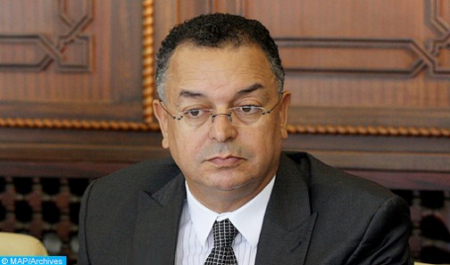Migration: Time to Establish More Sustainable Approach Between Europe and Africa
“It is time to rethink partnerships and neighborhood policies between Europe and Africa and establish a more sustainable and beneficial approach for both parties,” said Lahcen Haddad, member of the House of Advisors and former minister. In an op-ed published Wednesday by “Al-Sharq al-Awsat” newspaper under the title “Morocco and migration: leadership and challenges,” Haddad called for a new approach to migration that protects national sovereignty and for the opening of borders in a reasonable way to ensure a legal and sustainable movement of people between the countries of the North and the South. In his opinion, shared prosperity should be the basis of this new model of neighborhood policy between Europe and its partners on the southern shore. “The security approach alone is not sufficient. It is instead essential to foster legal and mutually beneficial immigration, simplify visa procedures for professionals, businessmen, students and seasonal workers from African countries, and encourage sustainable development in migrant-sending countries through efficient cooperation programs,” he said. Haddad noted that the organization of illegal migration by specialized networks has experienced profound changes, from the organization of transit through the Sahara, Libya and Algeria to attempts to attack the metal fences at Sebta and Melilia, the two Moroccan cities occupied by Spain. Since 2016, Moroccan law enforcement agencies have faced 145 attacks at Sebta and Melilla, including that of June 24, when about two thousand people, led by trained and heavily armed elements, attacked the crossing point between the cities of Nador and Melilia, the MP said. This shift to well-planned attempts characterized by the massive use of weapons, according to the author, may suggest that elements trained in organized and cross-border crime have become one of the main actors of illegal migration. All the countries concerned must shoulder their responsibilities and not use illegal migration for political and geostrategic purposes, Haddad insisted. No country has the right to facilitate the transit of migrants to another neighboring state, in violation of the principles of international law, he said. Praising Morocco’s efforts in the fight against the flow of illegal immigrants, the former minister noted that the Kingdom has dismantled over 1,300 illegal migration networks in the last five years alone, including 256 in 2021 and 100 in 2022, and has prevented the passage of about 360,000 illegal migrants. “The help provided by the European Union to Morocco in the field of migration is a fraction of what it needs in terms of equipment, human resources, training, logistics, monitoring, control centers and others,” he wrote. This issue is a major challenge since border guards and security forces must monitor the movement of arrivals and departures to Morocco over a stretch of 3,500 km. Migration is the result of the impasse in areas impoverished by climate change, desertification, deterioration of traditional livelihoods, the colonial stage, successive years of drought, corruption of political and local elites, ethnic and local conflicts and attacks by armed groups, Haddad concluded.

